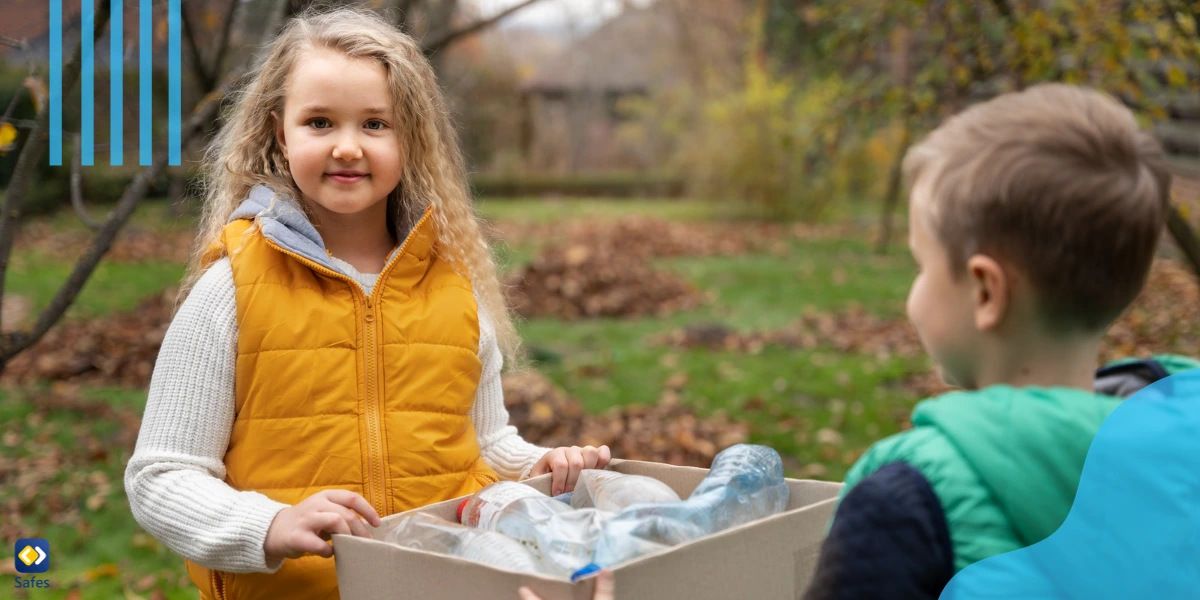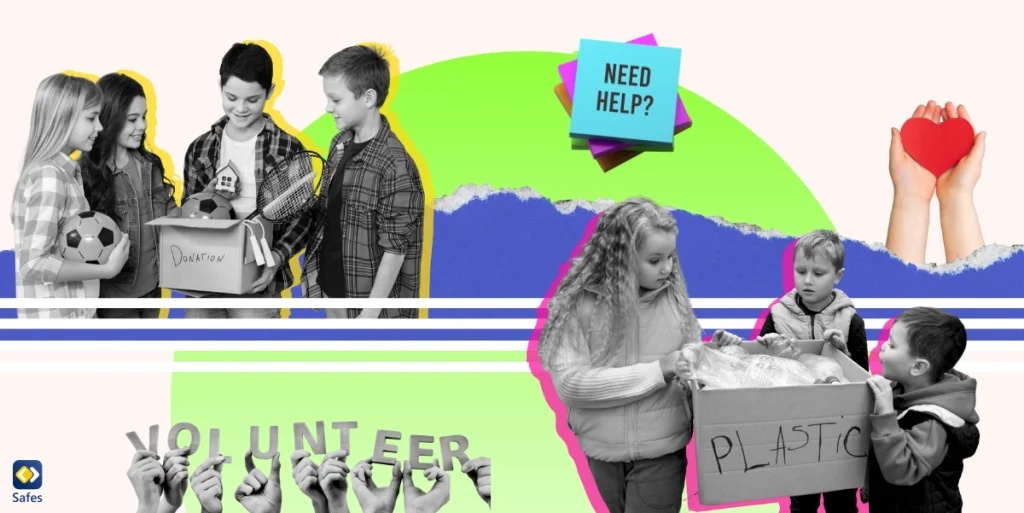In a world where materialism often overshadows compassion, introducing kids to volunteering is more crucial than ever. It’s a powerful antidote to the growing trend of materialistic person mindsets, especially among the younger generation. Through community service ideas for kids, they learn invaluable life lessons. Volunteering, even when it involves simple activites such as raking leaves, not only combats the lack of empathy in society but also nurtures a sense of responsibility and community spirit. Community service teaches children that they are capable of making a significant difference in the world around them.
Download and Start Your Free Trial of the Safes Parental Control App
Better Youth Through Volunteering
There’s no denying that through volunteering kids learn a lot of valuable skills. In these settings, children often encounter role models who demonstrate compassion, teamwork, and dedication. Observing and interacting with these figures, kids learn more than just the task at hand; they absorb vital emotional and social lessons.
Learning empathy is probably the most important outcome of volunteering. Working in diverse environments provides kids with ample opportunities to understand people who come from different backgrounds and face their own challenges. Moreover, volunteering instills a sense of responsibility in children. In other words, they learn that their actions, no matter how small, have consequences for them and others.
Community service activities are also excellent platforms for children to develop awareness about societal issues such as poverty and inequality. This awareness fosters a sense of belonging and a desire to contribute positively to society. As children grow into socially aware individuals, they carry these values into adulthood, becoming more active members of society.
The Transformative Power of Community Service Learning
In the heartwarming study “Impact of Community Service Learning on the Social Skills of Students,” researchers dove into the world of community service learning and its magical effects on young minds. Through engaging interviews with students from various O-level schools, the study uncovered a treasure trove of benefits. Besides giving extra credits, these programs mold our teenagers into empathetic, responsible citizens. The kids spoke of how their experiences boosted their social skills, stirred up a deep sense of social responsibility, and opened their eyes to the diverse needs and challenges in society.
The paper can be considered to be an endorsement for weaving community service into our school curriculums. The study shows how community projects for kids can be a powerful tool in shaping ethical, responsible characters. It’s a call to action for educational systems to embrace a more inclusive model of service learning. After all, it’s these experiences that help our kids step into the world not just as students, but as caring, engaged members of the community.

Choosing the Right Volunteer Activities
When it comes to volunteer ideas for kids, selecting activities that align with their age and interests is crucial. The most important issue here is connecting kids’ hobbies and passions with meaningful community service. This approach ensures that volunteering feels less like a chore and more like a fulfilling extension of their interests.
Involving children in the decision-making process is equally important. When kids have a say in choosing the activities, they feel more invested and enthusiastic. This could mean sitting down together and exploring different options, discussing what excites them, and what they feel they can contribute to. Whether it’s a love for animals, a knack for crafts, or an interest in gardening, there’s a volunteering opportunity out there that can harness and nurture these inclinations.
For Younger Children
For younger kids, volunteering should be about simple, engaging activities that capture their attention and imagination. Participating in community activities for kids, like helping at local animal shelters, can be a great start. These experiences teach compassion and responsibility while allowing them to interact with animals, which is often a joyful and educational experience for young children.
Another excellent option is getting involved in community arts and crafts projects. These activities not only foster creativity but also help children understand the value of contributing to community beautification and teamwork. These forms of volunteering with children offer them a sense of accomplishment and joy, laying a foundation for lifelong community engagement.
For Older Kids
When children grow older, they also develop an awareness of more complex social issues such as poverty. Therefore, activities like organizing a food drive for the poor seem like better choices. Activities such as this train their teamwork and logical thinking. It’s also an opportunity for them to see firsthand the impact of their efforts on the lives of others.
Contributing to a community garden is also another interesting activity that connects older kids with nature. It also educates them about sustainable practices and the importance of local food sources. Working in a community garden fosters a sense of responsibility and pride in nurturing something that benefits the whole community. These experiences help older kids develop a deeper connection with their local community and understand the broader impact of their volunteer work.
Community-Centric Volunteering Ideas
Volunteering at a local food bank is a tangible way for kids to see the impact of their efforts. They can help sort and pack food, learning about the organization and the importance of food security. According to Feeding America, in 2021, 42 million Americans, including 13 million children, faced food insecurity. Involvement in food banks allows children to contribute directly to alleviating this issue in their community.
Another excellent avenue for community service is the local library. Libraries often have programs that welcome young volunteers for tasks like organizing books, assisting in setting up events or even helping others learn to read. This activity, where parents can also volunteer with children, not only supports the library but also fosters a love for reading and learning in the volunteers themselves.
Creating care packages is another heartwarming activity. Kids can put together packages for various groups in need – such as the homeless, hospital patients, or overseas military personnel – and create local food pantries. This activity teaches compassion and thoughtfulness, as children consider what items would be most useful and appreciated by the recipients.

Independent Volunteering Initiatives
Guiding kids to start their own volunteer programs can be incredibly empowering. For instance, they could raise money for a cause they’re passionate about. This could involve organizing a small event, like a bake sale or a car wash, and teaching them about planning, marketing, and financial management. The process of raising money for a cause helps children understand the value of money and the impact it can have.
Another meaningful project is writing letters to children in hospitals. This simple act of kindness can brighten the day of a child facing health challenges. It teaches empathy and the power of words in lifting others’ spirits. Many hospitals have programs that welcome such letters, showing the real need and appreciation for these personal touches of kindness.
What Can Safes Do?
Even though the usual Windows or Macbook parental controls can help with digital safety, Safes, the parental control app, can go beyond that and play a significant role in supporting the values highlighted here. By using Safes, parents can manage and allocate specific screen time for their children, encouraging them to engage in real-world activities like volunteering. The app can help limit distractions from digital devices, fostering a focus on community service and empathy-building activities. Safes’ approach not only limits excessive screen time but also promotes a balanced, socially responsible lifestyle for children. You can download Safes on iOS and Android. Try Safes for free and start fostering a sense of responsibility and compassion in your children.
Final Thoughts
Volunteering is a vital tool in shaping the growth and development of children. It instills empathy, responsibility, and a deep sense of community. By engaging in activities like helping at local food banks, participating in community gardens, or even initiating their own projects, children learn valuable life skills. As parents and guardians, your encouragement and support in these endeavors are key. By guiding them towards these opportunities, you’re not just helping them fill their time constructively; you’re aiding in the development of compassionate, responsible future citizens. Let’s empower our children through volunteering, fostering a generation that values giving back and making a difference.
Your Child’s Online Safety Starts Here
Every parent today needs a solution to manage screen time and keep their child safe online.
Without the right tools, digital risks and excessive screen time can impact children's well-being. Safes helps parents set healthy boundaries, monitor activity, and protect kids from online dangers—all with an easy-to-use app.
Take control of your child’s digital world. Learn more about Safes or download the app to start your free trial today!




